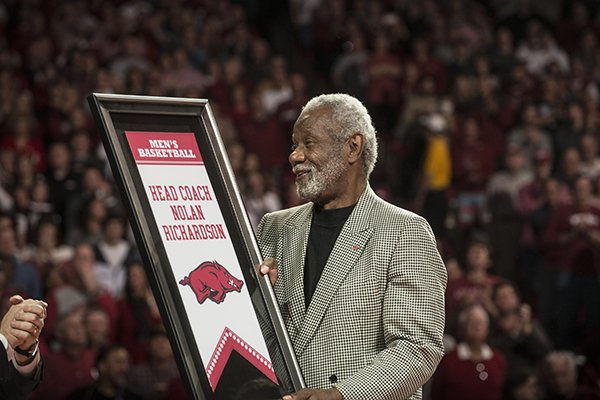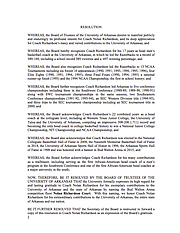HOT SPRINGS -- Nolan Richardson will again leave his mark at Walton Arena.
The University of Arkansas Board of Trustees voted Thursday during their regular meeting to name the Razorbacks' home court in Fayetteville after the coach who led the university to its only NCAA men's basketball title.
"That's wonderful. I certainly am honored," Richardson, 77, told the Arkansas Democrat-Gazette by phone Thursday.
Trustees also approved without dissent Thursday a resolution for Arkansas Chancellor Joe Steinmetz and Athletic Director Hunter Yurachek to study a way to honor former coach Eddie Sutton in a manner to be determined later.
The resolution to honor Richardson, recommended by Steinmetz and Yurachek, adds another chapter to the gradual reconciliation between the university and Richardson, whose tenure turned fraught amid a dispute and lawsuit over racial discrimination in the early 2000s.
Yurachek announced the court will be formally dedicated prior to the 2019-20 basketball season.
Trustees voted without dissent to name the court "Nolan Richardson Court," nearly 25 years to the day after Richardson led the Razorbacks to an NCAA championship. Arkansas defeated Duke 76-72 on April 4, 1994, in the title game.
The Razorbacks returned to the championship game the next season too but lost to UCLA.
Trustee John Goodson, the board chairman who introduced the resolution, said the honor was "long overdue."
Richardson took the men's basketball program to "the highest level," Goodson said, recalling the 1994 championship team's recent 25th anniversary celebration at Walton Arena.
"I think we've all been able to reflect on the impact Nolan Richardson had on the university," he said.
Steinmetz said naming the court for someone was a common topic when he arrived at the university in 2015. When asked why it took this long to name the court for Richardson, Steinmetz said he and Yurachek had planned it for months but chose to wait until after the 1994 championship team celebration to focus attention solely on Richardson.
The championship team's ceremony earlier this month cemented the idea, Steinmetz said. The love for Richardson "was palpable in the arena when he was announced," he said.
Yurachek would not comment Thursday, citing a self-imposed ban against speaking with media while he searches for a basketball coach to replace Mike Anderson, a long-time Richardson assistant whom Yurachek fired Tuesday after an 18-16 season in which the team failed to advance to the NCAA Tournament.
Yurachek told trustees that honoring Richardson is "much bigger" than the celebration of the 1994 championship team. Richardson's career at Arkansas spanned 17 seasons and numerous players who learned from him, he said.
Steinmetz called Richardson "legendary" beyond Arkansas.
Richardson was famous for his "40 minutes of hell," high-pressure style of play that led to the Razorbacks to 13 NCAA Tournament appearances, including three trips to the Final Four.
He won a school-record 389 games during his 17 seasons at Arkansas, two regular-season SEC championships, one SEC Tournament championship and three consecutive Southwest Conference tournaments from 1989-91.
Richardson was inducted into the Naismith Memorial Basketball Hall of Fame -- the sport's highest honor -- in 2014.
Sutton, Richardson's predecessor, coached at Arkansas from 1974-85, where he went 260-75 while leading the Razorbacks to nine NCAA Tournament appearances, including the 1978 Final Four.
Sutton, 83, retired in 2008 with 806 career victories, making him the eighth-winningest coach in NCAA men's basketball history.
Sutton is a finalist to be inducted this year into the Naismith Hall of Fame.
Steinmetz said ideas for Sutton include a statue or a display in the planned Hall of Honor at Walton Arena. Steinmetz said trustees and fans urged him and Yurachek to honor Sutton after they proposed recognizing Richardson.
"It appeared to us that we had to have a discussion about Eddie Sutton, as well," Steinmetz said.
Richardson was the first Razorback men's basketball coach whose teams competed in Walton Arena. It opened in fall 1993, the same season the Razorbacks finished 31-3 and won the national championship.
"Here in the last few days, I've stopped to think about how that all took place many years ago," Richardson said.
He recalled going to lunch with then-athletic director Frank Broyles and Walmart co-founder Bud Walton after the Razorbacks joined the SEC. Richardson and Broyles asked Walton for a $1 million donation to add 1,000 seats to the 9,000-seat Barnhill Arena, which was the team's current home at the time.
"I never will forget it," Richardson said. "We were sitting there eating, and he looked across the table and said, 'Frank, we can't do that. This man [Richardson], his teams have gotten so good and we have so many fans that want to watch games, we need a new building.' "
Instead, Walton donated $15 million for the arena.
Richardson said he liked Barnhill Arena and didn't want to move, but looking back Thursday he recalled overflow crowds at the 19,200-person capacity Walton Arena.
"So this brings back a lot of memories of something that was wonderful," he said.
Richardson's tenure at Arkansas came near the end of the 2002 season.
Despite leading the Razorbacks to the NCAA Tournament in 13 of the previous 14 seasons, Richardson was fired before the final game of the 2002 regular season, when his team was 13-14.
Asked about his job security following a game against Kentucky, Richardson said, "If they go ahead and pay me my money, they can take my job tomorrow."
During a news conference two days later in Fayetteville, Richardson said he was treated differently than other Arkansas coaches because he was black. He was fired after the next game, a loss at Mississippi State.
In 2004, Richardson sued the university, multiple university leaders and the Razorback Foundation for wrongful termination, alleging discrimination in federal court. His lawsuit was dismissed, and the decision was upheld on appeal.
The sides have reconciled in recent years, beginning in 2009 when Richardson and the 1994 team were recognized at halftime of a home basketball game.
Now comes the next step.
Richardson, who still lives in Fayetteville, said having one's name on a court is "one of the greatest honors that a person can receive."
"To me, that's huge to have your name on the court in the building that was born on your watch," he said. "That's very personal to me."
"A man's name is one of his most prideful possessions he can ever have," he continued. "So having my name on the court where my grandkids can see it or great-grandkids -- or whoever -- is very important to me."
Information for this article was contributed by Matt Jones of Whole Hog Sports.
Sports on 03/29/2019



